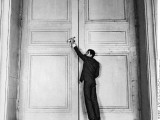Literary Estates
 Jamais deux sans trois. The old French saying proved accurate again: I had barely gotten over the weirdness of Paul Zukofsky’s announcement as to his intent to wring every possible & impossible penny out of his father Louis’s literary estate, research & researchers be damned, that by chance I perused Pierre Assouline’s blog La république des Livres, the latest post of which mentions Michael Orthofer’s The Literary Saloon speaking of the diabolical trio formed by Beckett’s publisher, Borges’ widow and Joyce nephew (oh, yes, I’ve dealt with this one, yikes…) when it comes to permissions. Assouline adds that Orthofer missed the husband of Tintin creator Hergé’s widow who belongs to the same level of hell. And the trois came via the latest Spiegel International Kulchur page, which details the Kafkaesque trials & travails of Eva Hoffe, daughter of Max Brod’s assistant, and inheritor via her mother of Kafka’s papers. Below the opening paras of the article. You can read the full version here.
Jamais deux sans trois. The old French saying proved accurate again: I had barely gotten over the weirdness of Paul Zukofsky’s announcement as to his intent to wring every possible & impossible penny out of his father Louis’s literary estate, research & researchers be damned, that by chance I perused Pierre Assouline’s blog La république des Livres, the latest post of which mentions Michael Orthofer’s The Literary Saloon speaking of the diabolical trio formed by Beckett’s publisher, Borges’ widow and Joyce nephew (oh, yes, I’ve dealt with this one, yikes…) when it comes to permissions. Assouline adds that Orthofer missed the husband of Tintin creator Hergé’s widow who belongs to the same level of hell. And the trois came via the latest Spiegel International Kulchur page, which details the Kafkaesque trials & travails of Eva Hoffe, daughter of Max Brod’s assistant, and inheritor via her mother of Kafka’s papers. Below the opening paras of the article. You can read the full version here.
The Trial
Fight for Kafka’s Papers Winds through Israeli Courts
By Christoph Schult
Before his death in 1924, Franz Kafka left his papers to Max Brod who rushed them out of Czechoslovakia ahead of the advancing Nazis. Now, the daughter of Brod’s late secretary wants to sell them to a German institute. But the legal battle in Israel has become Kafka-esque.
Someone must have been spreading lies about Eva H. because, although she keeps no valuables in her apartment, an intruder broke in late one night. Her cats suddenly raised their heads, and then the silhouette of a muscular man wearing white gloves appeared in front of the glass pane of her bedroom door.
Eva Hoffe, 75, picked up her mobile phone and dialed 100, the number of the Israeli police. “There’s a burglar in my house, Spinoza Street, Tel Aviv,” she whispered. “Are you sure that he’s still in your apartment?” asked the voice on the other end of the line. “He is standing in front of my bedroom door,” replied the old woman. By the time the police arrived, the mysterious intruder had fled.
Hoffe doesn’t believe this was a coincidence. A few days before the sinister nocturnal encounter, a detailed article had appeared about her in the Israeli newspaper Haaretz — exactly the kind of attention she didn’t want. Eva Hoffe is the daughter of Ilse Ester Hoffe, the former secretary of the late author Max Brod.
Brod is primarily known as Franz Kafka’s friend, mentor and biographer. It wasn’t until Brod posthumously published the novels “The Trial” and “The Castle” in the 1920s that Kafka became world famous. Without Brod, Kafka’s works would have been forgotten.
Kafka suffered from a wide range of mental and physical conditions and, before he died of complications connected with tuberculosis in 1924, he entrusted Brod with a sheaf of handwritten documents and asked him to destroy the unpublished manuscripts after his death. Brod ignored his friend’s last wishes. When the Nazis invaded Czechoslovakia in 1939, he packed the documents in a suitcase and fled to Tel Aviv. Brod died there in 1968 and bequeathed these papers to his secretary Ester Hoffe. When she died two years ago at the age of 101, her two daughters, Eva Hoffe and the older sister Ruth Wiesler, inherited the collection — at least that’s what they thought.

 Poasis II: Selected Poems 2000-2024
Poasis II: Selected Poems 2000-2024 “Todesguge/Deathfugue”
“Todesguge/Deathfugue” “Interglacial Narrows (Poems 1915-2021)”
“Interglacial Narrows (Poems 1915-2021)” “Always the Many, Never the One: Conversations In-between, with Florent Toniello”
“Always the Many, Never the One: Conversations In-between, with Florent Toniello” “Conversations in the Pyrenees”
“Conversations in the Pyrenees” “A Voice Full of Cities: The Collected Essays of Robert Kelly.” Edited by Pierre Joris & Peter Cockelbergh
“A Voice Full of Cities: The Collected Essays of Robert Kelly.” Edited by Pierre Joris & Peter Cockelbergh “An American Suite” (Poems) —Inpatient Press
“An American Suite” (Poems) —Inpatient Press “Arabia (not so) Deserta” : Essays on Maghrebi & Mashreqi Writing & Culture
“Arabia (not so) Deserta” : Essays on Maghrebi & Mashreqi Writing & Culture “Barzakh” (Poems 2000-2012)
“Barzakh” (Poems 2000-2012) “Fox-trails, -tales & -trots”
“Fox-trails, -tales & -trots” “The Agony of I.B.” — A play. Editions PHI & TNL 2016
“The Agony of I.B.” — A play. Editions PHI & TNL 2016 “The Book of U / Le livre des cormorans”
“The Book of U / Le livre des cormorans” “Memory Rose Into Threshold Speech: The Collected Earlier Poetry of Paul Celan”
“Memory Rose Into Threshold Speech: The Collected Earlier Poetry of Paul Celan” “Paul Celan, Microliths They Are, Little Stones”
“Paul Celan, Microliths They Are, Little Stones” “Paul Celan: Breathturn into Timestead-The Collected Later Poetry.” Translated & with commentary by Pierre Joris. Farrar, Straus & Giroux
“Paul Celan: Breathturn into Timestead-The Collected Later Poetry.” Translated & with commentary by Pierre Joris. Farrar, Straus & Giroux